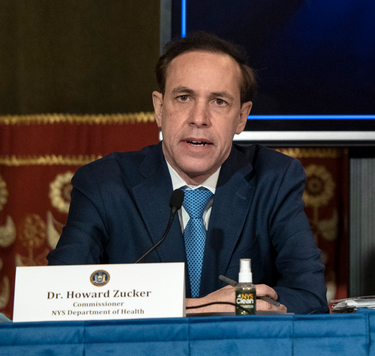Health Commissioner Zucker resigns
ALBANY COUNTY — Howard Zucker, who oversaw the state’s response to COVID-19 under former governor Andrew Cuomo, submitted his resignation on Thursday as the state’s health commissioner.
Kathy Hochul, who replaced Cuomo in August, had said she would need 40 to 45 days to put her team in place. On Thursday, she said that Zucker would serve until she found a replacement.
In his seven-paragraph resignation letter, Zucker looked back at his seven years and five months as commissioner, commending the more than 5,000 staffers in the health department.
“I have the utmost confidence in the members of the department of health,” he wrote, “who have been a true source of knowledge and arduousness during the many unrelenting crises that I have shouldered during my tenure, spanning the spectrum from managing Ebola, Legionella, Zika, Covid-19 and the measles outbreak to tackling e-cigarettes, the opioid epidemic, water quality/safety, maternal mortality, banning fracking and the development of a medical marijuana program, to name just a few.”
Zucker had come under fire for his opaque reporting of nursing-home deaths and also for a March 25, 2020 health-department order that “[n]o resident shall be denied re-admission or admission to the nursing home solely based on a confirmed or suspected diagnosis of COVID-19. Nursing homes are prohibited from requiring a hospitalized resident who is determined medically stable to be tested for COVID-19 prior to admission or re-admission.”
The guidance, which was rescinded with a May 10 executive order, was associated with “a statistically significant increase in resident deaths,” according to an Empire Center analysis; based in Albany, the center is a nonpartisan, not-for-profit think tank.
The state’s policy was adopted because of concern about hospitals reaching capacity in the midst of the pandemic’s spring of 2020 surge in New York.
On Jan. 28, the office of Attorney General Letitia James issued a report that found, among other problems, more nursing-home residents died of COVID-19 than data from the state’s health department reflected.
In response to the report’s suggestion that nursing home residents who die in hospitals should be counted as nursing-home deaths, Zucker said, “DOH has consistently made clear that our numbers are reported based on the place of death.”
In February, during one of Cuomo’s COVID-19 press briefings at which Zucker was a staple, he gave a lengthy explanation of the decision-making process that led to the March 25 memo, setting it in the context of the surging pandemic.
“March 25th was not the driver of COVID infections. It was not the driver of COVID fatalities,” said Zucker. “The facts are the facts.”
“The salient policy question isn’t whether the March 25th memo introduced COVID into nursing homes, but whether it contributed to higher infection and mortality rates,” responded Bill Hammond, senior fellow at the Empire Center.
Hammond went on, “In its own report from July, the DOH specifically posed the question: ‘Did admissions increase mortality?’ and then exonerated itself based on cherry-picked data. The newly released numbers suggest otherwise — that admissions were indeed associated with higher mortality.
The attorney general’s report said the state’s guidance was consistent with guidance from the the Centers for Medicare and Medicaid Services at the time and also with CDC Published Transmission-Based Precaution guidance.
“It is worth noting,” says the report, “that to the extent New York hospitals had capacity concerns due to the pandemic, the March 25 guidance would have been helpful to communities where those facilities were experiencing longer COVID-19 patient stays due to delays in receiving testing results, and were at or exceeding acute care capacity while they simultaneously were anticipating more new patients in need of acute care.”
The report goes on, “DOH has said that nothing in the guidance stated that a facility should accept patients who could not be safely cared for. As to whether the March 25 guidance affected risks to residents, DOH presented data reflecting the spike in health care worker infection and the later spike in deaths as circumstantial support for the position that the guidance did not contribute much to resident risks or deaths.”
DOH has said the median hospital stay was nine days after which a patient is likely not contagious.
The report goes on, “Data linking the number of nursing home deaths to the admissions policy contained in the March 25 guidance is obscured by that same guidance, which also prohibited nursing homes from requiring COVID-19 testing as a criterion for admission.”
A federal investigation as well as one by the State Assembly into the nursing-home data is currently underway.
This summer, as the Delta variant surged, just weeks before schools were to open, while districts waited for guidance from the state’s health department, Zucker issued a two-sentence statement, saying, “With the end of the state disaster emergency on June 25, 2021, school districts are reestablished as the controlling entity for schools.”
School districts were left on their own as locally and elsewhere groups of parents demanded an end to mask mandates and other rules.
On her first day as governor, Hochul said she was “immediately directing the Department of Health to institute universal masking for anyone entering our schools.” She also said all school personnel would have to be vaccinated or tested weekly for COVID-19.
Booster shots
Weighing in on vaccine booster shots, the Food and Drug Administration on Wednesday issued its guidance for a more limited use than the Biden administration had called for. Joe Biden had made the case for all Americans vaccinated against COVID-19 to get a booster shot.
The FDA, in a release, said amended the emergency use authorization solely for the Pfizer-BioNTech COVID-19 vaccine will allow for a single booster dose, to be administered at least six months after completion of the primary series in:
— Individuals 65 years of age and older;
— Individuals 18 through 64 years of age at high risk of severe COVID-19; and
— Individuals 18 through 64 years of age whose frequent institutional or occupational exposure to SARS-CoV-2 puts them at high risk of serious complications of COVID-19 including severe COVID-19.
“After considering the totality of the available scientific evidence and the deliberations of our advisory committee of independent, external experts, the FDA amended the EUA for the Pfizer-BioNTech COVID-19 Vaccine to allow for a booster dose in certain populations such as health care workers, teachers and day care staff, grocery workers and those in homeless shelters or prisons, among others,” said Acting FDA Commissioner Janet Woodcock, M.D., in a statement.
“This pandemic is dynamic and evolving,” she went on, “with new data about vaccine safety and effectiveness becoming available every day. As we learn more about the safety and effectiveness of COVID-19 vaccines, including the use of a booster dose, we will continue to evaluate the rapidly changing science and keep the public informed.”
On Thursday evening, the Advisory Committee on Immunization Practices for the Centers for Disease Control and Prevention recommended that Pfizer-BioNTech booster shots should be given to people 65 and older, to nursing home residents, and to adults with underlying health conditions.
However, the CDC committee differed from the FDA, rejecting, in a split vote, giving booster shots to frontline health workers, first responders, nursing-home staff, teachers, and other essential workers.
Earlier on Thursday, at an event in New York City, Hochul conceded there has been “conflicting information coming out of the federal government and it keeps changing.”
She went on, “Everyone’s doing the best they can. Their circumstances are evolving. We don't have a playbook on how to deal with the global pandemic, but I do trust the CDC in this administration. I trust the FDA and we’ll also have our other additional layer of scrutiny, but this will not delay us getting those boosters out to people.”
She also said, “We know how to set up the sites. Lot of employers are making it available onsite. We know that the pharmacies are heavily engaged. We know we're going to be going again into nursing homes. So we are prepared … There's already 8,000 people ready to roll for our booster shots.”
Clean Green Schools
Also on Thursday, Hochul allocated $59 million for the new Clean Green Schools initiative, which aims to advance clean energy and energy-efficiency solutions to improve indoor air quality and reduce emissions for more than 500 public and private Pre-K-12 schools in disadvantaged communities across the state.
As part of the program, the state will convene education leaders this fall, including school superintendents, administrators, and educators, to inform the initiative launching in early 2022 to address climate justice issues and create improved, healthier learning environments for students.
The state has a goal of an 85 percent reduction in greenhouse gas emissions by 2050 under the Climate Leadership and Community Protection Act.
Administered by the New York State Energy Research and Development Authority, the Clean Green Schools initiative will provide technical, financial, and staff support to help schools in underserved areas evaluate, plan for, and implement energy efficient and clean heating and cooling projects to benefit the most vulnerable New Yorkers.
Fake vax cards
The state’s Division of Consumer Protection on Thursday warned New Yorkers about the risks of using or buying fake COVID-19 vaccination cards.
As more and more places are requiring proof of vaccination, scammers are taking advantage of this opportunity by selling fake verification tools including fake cards, certificates, test results or even doctors’ notes, the division said in a release, adding, “New Yorkers should be aware that buying fake vaccine cards, making their own or filling the blanks with false information is illegal and could land them in jail.”
New Yorkers are urged to report vaccine-related fraud by calling 833-VAX-SCAM (833-829-7226) or emailing STOPVAXFRAUD@health.ny.gov.
Football teams in on vax action
Also on Thursday, Hochul announced an integrated media and vaccine incentive program in partnership with all three New York professional football teams to support vaccinations among currently unvaccinated New Yorkers.
The marketing effort and #VaxandWin Football Sweepstakes includes the Buffalo Bills, the New York Giants, and the New York Jets.
The campaign includes vaccine encouragement videos and radio segments with alumni players from each team who have each received the COVID-19 vaccine themselves as well as messaging across each team’s media channels including television, radio in English and Spanish through the New York Giants, podcast, digital, and social media.
Newest numbers
Albany County Executive Daniel McCoy announced 87 new cases of COVID-19 in a Thursday morning release.
Albany County’s most recent seven-day average of percent positive rates is now down to 4.4 percent and the Capital Region’s average rate remained at 4.0 percent.
There are now 530 active cases in the county, up from 512 yesterday. The number of Albany County residents under quarantine increased to 1,183 from 1,064.
There were five new hospitalizations since Wednesday, and 40 county residents are now hospitalized with the virus — a net increase of one. There are currently nine patients in intensive-care units, down from 10 on Wednesday.
Albany County’s COVID-19 death toll remains at 400.
“We’re seeing the daily average of new COVID infections decline in Albany County, which is encouraging news and I hope this trend continues. However, we still have 40 residents hospitalized with the virus right now.
“Half of them are between the ages of 50 and 74 years old, a quarter of them are younger than 50, while two are younger than 25,” said McCoy in the release. “The best way to prevent more infections and hospitalizations is by getting vaccinated if you haven’t already, wearing a mask indoors, staying home if you’re sick and coughing and sneezing into your elbow.”



